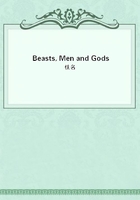
第84章 BEFORE THE FACE OF BUDDHA(2)
The General rose and all the others followed him. He took leave of each one separately and sternly. Only before Jahantsi Lama he bent low while the Hutuktu placed his hands on the Baron's head and blessed him. From the Council Chamber we passed at once to the Russian style house which is the personal dwelling of the Living Buddha. The house was wholly surrounded by a crowd of red and yellow Lamas; servants, councilors of Bogdo, officials, fortune tellers, doctors and favorites. From the front entrance stretched a long red rope whose outer end was thrown over the wall beside the gate. Crowds of pilgrims crawling up on their knees touch this end of the rope outside the gate and hand the monk a silken hatyk or a bit of silver. This touching of the rope whose inner end is in the hand of the Bogdo establishes direct communication with the holy, incarnated Living God. A current of blessing is supposed to flow through this cable of camel's wool and horse hair. Any Mongol who has touched the mystic rope receives and wears about his neck a red band as the sign of his accomplished pilgrimage.
I had heard very much about the Bogdo Khan before this opportunity to see him. I had heard of his love of alcohol, which had brought on blindness, about his leaning toward exterior western culture and about his wife drinking deep with him and receiving in his name numerous delegations and envoys.
In the room which the Bogdo used as his private study, where two Lama secretaries watched day and night over the chest that contained his great seals, there was the severest simplicity. On a low, plain, Chinese lacquered table lay his writing implements, a case of seals given by the Chinese Government and by the Dalai Lama and wrapped in a cloth of yellow silk. Nearby was a low easy chair, a bronze brazier with an iron stovepipe leading up from it;on the walls were the signs of the swastika, Tibetan and Mongolian inscriptions; behind the easy chair a small altar with a golden statue of Buddha before which two tallow lamps were burning; the floor was covered with a thick yellow carpet.
When we entered, only the two Lama secretaries were there, for the Living Buddha was in the small private shrine in an adjoining chamber, where no one is allowed to enter save the Bogdo Khan himself and one Lama, Kanpo-Gelong, who cares for the temple arrangements and assists the Living Buddha during his prayers of solitude. The secretary told us that the Bogdo had been greatly excited this morning. At noon he had entered his shrine. For a long time the voice of the head of the Yellow Faith was heard in earnest prayer and after his another unknown voice came clearly forth. In the shrine had taken place a conversation between the Buddha on earth and the Buddha of heaven--thus the Lamas phrased it to us.
"Let us wait a little," the Baron proposed. "Perhaps he will soon come out."As we waited the General began telling me about Jahantsi Lama, saying that, when Jahantsi is calm, he is an ordinary man but, when he is disturbed and thinks very deeply, a nimbus appears about his head.
After half an hour the Lama secretaries suddenly showed signs of deep fear and began listening closely by the entrance to the shrine. Shortly they fell on their faces on the ground. The door slowly opened and there entered the Emperor of Mongolia, the Living Buddha, His Holiness Bogdo Djebtsung Damba Hutuktu, Khan of Outer Mongolia. He was a stout old man with a heavy shaven face resembling those of the Cardinals of Rome. He was dressed in the yellow silken Mongolian coat with a black binding. The eyes of the blind man stood widely open. Fear and amazement were pictured in them. He lowered himself heavily into the easy chair and whispered: "Write!"A secretary immediately took paper and a Chinese pen as the Bogdo began to dictate his vision, very complicated and far from clear.
He finished with the following words:
"This I, Bogdo Hutuktu Khan, saw, speaking with the great wise Buddha, surrounded by the good and evil spirits. Wise Lamas, Hutuktus, Kanpos, Marambas and Holy Gheghens, give the answer to my vision!"As he finished, he wiped the perspiration from his head and asked who were present.
"Khan Chiang Chin Baron Ungern and a stranger," one of the secretaries answered on his knees.
The General presented me to the Bogdo, who bowed his head as a sign of greeting. They began speaking together in low tones. Through the open door I saw a part of the shrine. I made out a big table with a heap of books on it, some open and others lying on the floor below; a brazier with the red charcoal in it; a basket containing the shoulder blades and entrails of sheep for telling fortunes.
Soon the Baron rose and bowed before the Bogdo. The Tibetan placed his hands on the Baron's head and whispered a prayer. Then he took from his own neck a heavy ikon and hung it around that of the Baron.
"You will not die but you will be incarnated in the highest form of being. Remember that, Incarnated God of War, Khan of grateful Mongolia!" I understood that the Living Buddha blessed the "Bloody General" before death.
During the next two days I had the opportunity to visit the Living Buddha three times together with a friend of the Bogdo, the Buriat Prince Djam Bolon. I shall describe these visits in Part IV.